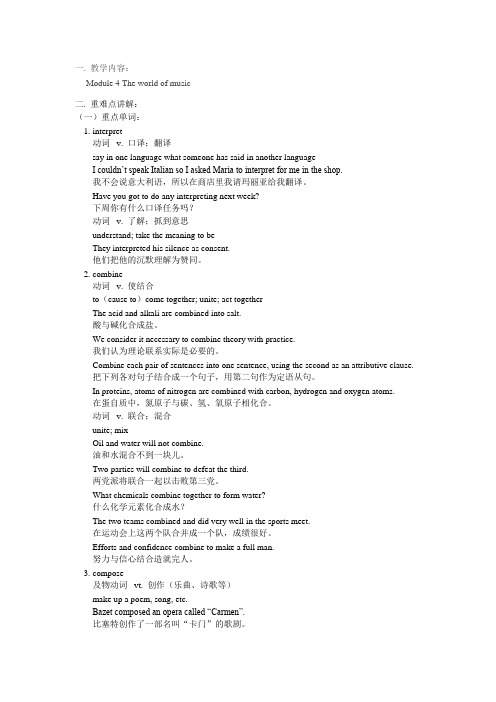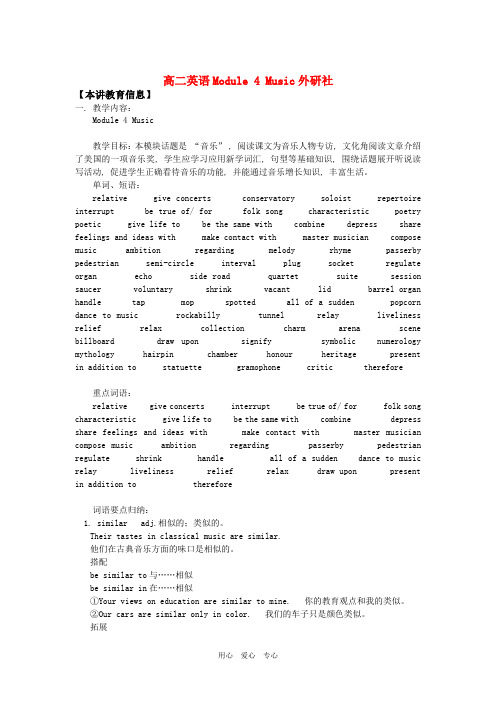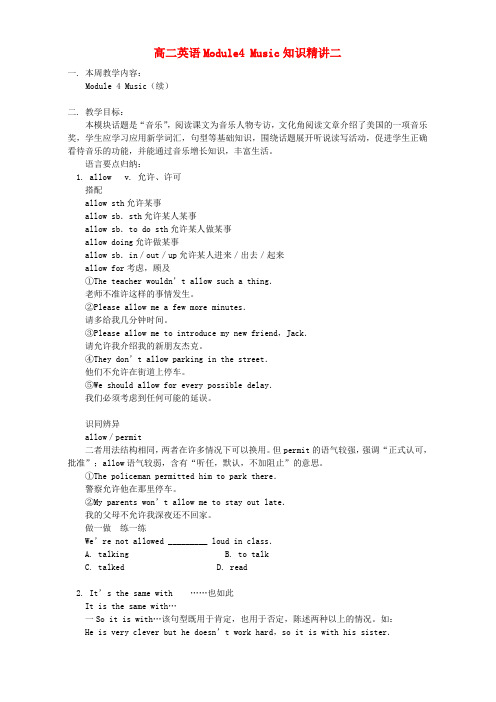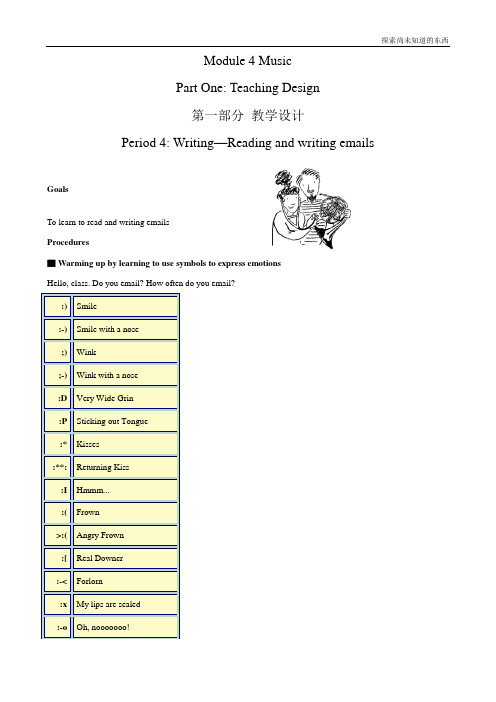外研版高中英语必修二Module 4Musicintroduction,reading and vocabulary717张PPT课件ppt
外研版高中英语必修二Module 4MusicGrammar学案1

一. 教学内容:Module 4 The world of music二. 重难点讲解:(一)重点单词:1. interpret动词v. 口译;翻译say in one language what someone has said in another languageI couldn’t speak Italian so I asked Maria to interpret for me in the shop.我不会说意大利语,所以在商店里我请玛丽亚给我翻译。
Have you got to do any interpreting next week?下周你有什么口译任务吗?动词v. 了解;抓到意思understand; take the meaning to beThey interpreted his silence as consent.他们把他的沉默理解为赞同。
2. combine动词v. 使结合to(cause to)come together; unite; act togetherThe acid and alkali are combined into salt.酸与碱化合成盐。
We consider it necessary to combine theory with practice.我们认为理论联系实际是必要的。
Combine each pair of sentences into one sentence, using the second as an attributive clause.把下列各对句子结合成一个句子,用第二句作为定语从句。
In proteins, atoms of nitrogen are combined with carbon, hydrogen and oxygen atoms.在蛋自质中,氮原子与碳、氢、氧原子相化合。
动词v. 联合;混合unite; mixOil and water will not combine.油和水混合不到一块儿。
高二英语Module 4 Music外研社知识精讲.doc

高二英语Module 4 Music外研社【本讲教育信息】一. 教学内容:Module 4 Music教学目标:本模块话题是“音乐”, 阅读课文为音乐人物专访, 文化角阅读文章介绍了美国的一项音乐奖, 学生应学习应用新学词汇, 句型等基础知识, 围绕话题展开听说读写活动, 促进学生正确看待音乐的功能, 并能通过音乐增长知识, 丰富生活。
单词、短语:relative give concerts conservatory soloist repertoire interrupt be true of/ for folk song characteristic poetry poetic give life to be the same with combine depress share feelings and ideas with make contact with master musician composemusic ambition regarding melody rhyme passerby pedestrian semi-circle interval plug socket regulate organ echo side road quartet suite session saucer voluntary shrink vacant lid barrel organ handle tap mop spotted all of a sudden popcorn dance to music rockabilly tunnel relay liveliness relief relax collection charm arena scene billboard draw upon signify symbolic numerology mythology hairpin chamber honour heritage present in addition to statuette gramophone critic therefore重点词语:relative give concerts interrupt be true of/ for folk song characteristic give life to be the same with combine depress share feelings and ideas with make contact with master musician compose music ambition regarding passerby pedestrian regulate shrink handle all of a sudden dance to music relay liveliness relief relax draw upon present in addition to therefore词语要点归纳:1. similar adj.相似的;类似的。
外研版高中英语必修二Module 4Musicintroduction,reading and voca教案1

Module 4 MusicPart Two: Teaching ResourcesModule 4 MusicSection 2: Background information for Module 41.What is music?MusicMusic is a natural intuitive phenomenon operating in the three worlds of time, pitch, energy, and under the three distinct and interrelated organization structures of rhythm, harmony, and melody.Since the music phenomenon is natural and intuitive, humans can also virtually perform and hear music in their minds, without even learning or understanding it.Traditionally, one of the major difficulties in defining music has been to use the word to try to describe all activities and things related to music and/or sound. For example, scores only become music through performance(s), or when (recorded) performances are replayed.While music is a natural intuitive phenomenon, composing, improvising and performing it are art forms. Also, listening to it can be a source of entertainment, while learning and understanding it are disciplines.For analogy, walking is an activity that uses the natural and intuitive phenomenon of gravity, but walking is not gravity. Using the term gravity to represent all things related to gravity does not help define the term. The same is true for music. See Definitions of music and the 'What is music?' section located below.2.What is a musician?A musician is a person who plays or composes music. Musicians can be classified by their role in production, including instrument and genre:●A singer (also called a vocalist) uses his or her voice as an instrument (rar ely considered a musician unless he/she composes music).●An instrumentalist plays a musical instrument.●Composers and songwriters make up music and write it down.●A conductor coordinates a musical ensemble.Musicians may also dance or produce choreography. The concept of the musician and the status of the musician in society is culture-specific. Think, for instance, about your own concepts relating to "the heavy metalist", "the folk musician", "the DJ", "the sarangi player", "the female drummer", and so on. See also: performer.Musicians may also be distinguished as amateur or professional. Professional musicians may work freelance, contract with a studio or label, or may be employed by an institution such as a church or business such as a bar.Songs may be produced by some animals, including birds. Although many would surely debate whether birds are musicians, their ability to produce variations on the characteristic song of their species is a subject deserving moreresearch (though relating less to music and more to animal communication). The freestyle chatter of even common birds, although lacking the complexity of methods employed by human beings, must be regarded as having some relation to the origins of music. Human beings did not begin producing music by banging away on a keyboard, nor are they the only creatures which respond to (or produce) rhythm and melody.3. Chinese MusicMusic of China appears to date back to the dawn of Chinese civilization, and documents and artifacts provide evidence of a well-developed musical culture as early as the Zhou Dynasty (1122 BC - 256 BC).According to Mencius, a ruler had asked Mencius whether it was moral if he preferred pop songs to the classics. The answer was that the only thing matters being whether or not he loved his subjects.The Imperial Music Bureau, first established in the Qin Dynasty (221-207 BC), was greatly expanded under the Emperor Han Wu Di (140-87 BC) and charged with supervising court music and military music and determining what folk music would be officially recognized. In subsequent dynasties, the development of Chinese music was strongly influenced by foreign music, especially that of Central Asia.4. What is emotion?“emotion” is a term commonly and loosely used to denote indivi dual, subjective feelings which dictate moods. In psychology, emotion is considered a response to stimuli that involves characteristic physiological changes—such as increase in pulse rate, rise in body temperature, greater or less activity of certain glands, change in rate of breathing—and tends in itself to motivate the individual toward further activity. Early psychological studies of emotion tried to determine whether a certain emotion arose before the action, simultaneously with it, or as a response to automatic physiological processes. In the 1960s, the Schachter-Singer theory pointed out that cognitive processes, not just physiological reactions, played a significant role in determining emotions. Robert Plutchik developed (1980) a theory showing eight primary human emotions: joy, acceptance, fear, submission, sadness, disgust, anger, and anticipation, and argued that all human emotions can be derived from these. Psychologists Sylvan Tomkins (1963) and Paul Ekman (1982) have contended that "basic" emotions can be quantified because all humans employ the same facial muscles when expressing a particular emotion. Studies done by Ekman suggest that muscular feedback from a facial expression characteristic of a certain emotion results in the experience of that emotion. Since emotions are abstract and subjective, however, they remain difficult to quantify: some theories point out that non-Western cultural groups experience emotions quite distinct from those generally seen as "basic" in the West.。
高二英语Module4 Music知识精讲二 外研社

高二英语Module4 Music知识精讲二一. 本周教学内容:Module 4 Music(续)二. 教学目标:本模块话题是“音乐”,阅读课文为音乐人物专访,文化角阅读文章介绍了美国的一项音乐奖,学生应学习应用新学词汇,句型等基础知识,围绕话题展开听说读写活动,促进学生正确看待音乐的功能,并能通过音乐增长知识,丰富生活。
语言要点归纳:1. allow v. 允许、许可搭配allow sth允许某事allow sb.sth允许某人某事allow sb.to do sth允许某人做某事allow doing允许做某事allow sb.in/out/up允许某人进来/出去/起来allow for考虑,顾及①The teacher wouldn’t allow such a thing.老师不准许这样的事情发生。
②Please allow me a few more minutes.请多给我几分钟时间。
③Please allow me to introduce my new friend,Jack.请允许我介绍我的新朋友杰克。
④They don’t allow parking in the street.他们不允许在街道上停车。
⑤We should allow for every possible delay.我们必须考虑到任何可能的延误。
识同辨异allow/permit二者用法结构相同,两者在许多情况下可以换用。
但permit的语气较强,强调“正式认可,批准”;allow语气较弱,含有“听任,默认,不加阻止”的意思。
①The policeman permitted him to park there.警察允许他在那里停车。
②My parents won’t allow me to stay out late.我的父母不允许我深夜还不回家。
做一做练一练We’re not allowed _________ loud in class.A. talkingB. to talkC. talkedD. read2. It’s the same with……也如此It is the same with…一So it is with…该句型既用于肯定,也用于否定,陈述两种以上的情况。
外研版高中英语必修二Module 4Musicintroduction,reading and voca教案4

Module 4 MusicPart One: Teaching Design第一部分教学设计Period 4: Writing—Reading and writing emails GoalsTo learn to read and writing emailsProcedures▇ Warming up by learning to use symbols to express emotionsHello, class. Do you email? How often do you email?:)Smile:-)Smile with a nose;)Wink;-)Wink with a nose:D Very Wide Grin:P Sticking out Tongue:*Kisses:**:Returning Kiss:I Hmmm...:(Frown>:(Angry Frown:[Real Downer:-<Forlorn:x My lips are sealed:-o Oh, nooooooo!Here are some symbols be used to express emotions in emails. Study them and try to put them into use.▇Before you readBefore you read the email on page 38 please go over the word list for this module, paying attention to the pronunciation of the word, the relationship between its pronunciation and its spelling.▇While you readNow go to page 38 to read the email and cut/ the sentences into thought groups, blacken the predicates, underline the useful expressions and darken the connectives.▇After you readNow copy all the useful expressions into your Expression Book and make your own sentences with them.■Closing down by talking about the result of a surveyTo end this period let’s see the result of 2006 SmartGirls Music Survey. Altogether 500 girls responded that they listen to other types of music other than the ones listed. These other types of music that SmartGirls listen to included:●Techno (6)●Punk, Thrash, Ska (19)●Comedy Recordings (1)●80's (6)●Dance/Trance (6)●Emo (emotional hardcore) (2)●Cultural/World Beat (8)●Inspirational (1)●Metal (11)●Christian (12)●Garage (3)●Folk (3)●Indie Rock (1)●Goth (1)●Soul (1)●Classic Rock (1)●Soft Rock (2)●Instrumental (1)Do you like any of the above music? What is your favorite music?。
外研版高中英语必修二《Music》优质课公开课课件、教案

外研版高中英语必修二《Music》优质课公开课课件、教案Module 3 MusicI.教学内容分斩本模块以“Music”为话题。
学生通过本模块的学习可以了解古今中外的音乐家,提高他们的音乐欣赏水平,培养他们对音乐的评价和鉴赏能力,从而丰富学生的音乐知识,提高学生的艺术修养。
Introduction部分通过设计的两个活动让学生复习和学习一些常见的乐器的名称,激发学生学习本模块的兴趣。
Reading and Vocabulary该部分向同学们介绍了音乐家海顿、莫扎特和贝多芬以及他们的伟大成就。
让同学们在阅读的过程中了解音乐家的奋斗历程,树立正确的人生观和价值观。
通过相关的活动,训练学生的综合语言能力。
Grammar 1学习并巩固时间状语从句。
Writing要求学生阅读一封外国朋友的电子邮件,并根据问题写一封回信。
Function通过回答问题和完成句子让学生懂得如何表达喜好和厌恶,从而初步培养学生的鉴赏能力。
Listening and Vocabulary首先通过听力活动帮助学生了解和学习有关英国乐队The Beatles的背景知识,接着让学生学习新的词汇。
在训练学生听力的同时考查学生的理解能力。
Grammar 2复习过去完成时态。
通过练习帮助学生巩固过去完成时态的基本用法。
Pronunciation学会如何在日常交际中使用升调和降调。
Everyday English要求学生掌握表达喜好的一些用语和有关音乐的日常用语。
Cultural Corner学习一篇有关著名作曲家叶小刚的文章,了解他的音乐经历和音乐成就,增强学生的民族自豪感。
Task训练学生仿写一篇介绍著名音乐家生平和作品的文章。
Module File对整个模块的学习内容进行归纳总结,有助于学生对所学知识进行复习和巩固。
II.教学重点和难点1.教学重点(1)本模块的生词和短语。
(2)弄清楚时间状语从句和过去完成时态的用法。
(3)谈论有关音乐的话题。
高中英语Module4MusicSectionⅠIntroduction&Reading_Pre_reading教学案外研版

Module 4 Music Section Ⅰ Introduction &Reading-Pre-readingMichael Jackson was born in Gary, Indiana in 1958. He was the seventh of nine children. He was five years old when he began singing with his brothers in a group called the Jackson 5.Michael was the star of the group — the Jackson 5. He was the lead singer and danced with great energy. His extraordinary skill and presence on stage was remarkable, especially for someone so young.In 1982, Jackson released Thriller. The album was not just the bestselling album of all time. It also won eight Grammy Awards and seven American Music Awards. And it helped establish the popularity of a new form of entertainment, music videos.Michael Jackson was a huge success, but he was also a very troubled man. His behaviors and appearance became increasingly strange. He had many operations to change his face. Jackson bought a huge property in California and he had amusement park rides, a zoo and a large movie theater built for his home. Michael Jackson also went into major debt. And he suffered from injuries and illnesses that reportedly led him to take m any kinds of painkilling medicines.Michael Jackson died on June 25th, 2009 of heart failure. He was just days awayfrom launching a series of 50 concerts in London.Section_ⅠIntroduction_&_Reading_—_Prereading[原文呈现][读文清障]An Interview with Liu Fang Part 1Liu Fang is an international music star, famous for①her work with traditional Chinese instruments. She was born in 1974 and has played the pipa since the age of six. She's givenconcerts② since she was eleven, including③ a performance for the Queen of England during her visit to China. She graduated from④the Shanghai Conservatory⑤ of Music, where she also studied the guzheng in 1993⑥.What is your musical training and background?My mother is a Dianju actress. Dianju is a kind of Chinese opera, which includes singing, dancing and acting⑦. When I was a child, she took me to performances⑧. I listened to music before I could speak! When I was five years old, she taught me to play⑨ the yueqin.In 1990, when I was 15 years old, I went to the Shanghai Conservatory of Music, where I studied the pipa and the guzheng⑩. After I graduated, I went back to my hometown of Kunming and worked as ⑪ a pipa soloist⑫ of the Kunming Music①(be) famous for因……而著名此处为形容词短语在句中作后置定语,相当于定语从句who is famous for her work ...。
外研版高中英语必修二Module 4Musicintroduction,reading and voca学案2

Book VI Module 4 复习学案Period IApril一、Words1、亲戚 2. interpret 3. 结合4、使沮丧5、关于6、抱负7、melody 8、过路人9、规定;管理10、自愿的11、变小12、空缺的13. collection 14、吸引15. signify16、象征的17、敬重18、遗户19、赠送,颂发20、因此,所以二、完美句子:根据提示完成下列句子。
1、你昨天没穿大衣出去。
难怪你感冒了。
You went out without a coat yesterday. you had a cold.2、我受不了和简住在一起,她总是挑我的毛病。
in the same room with Jane. She’s always finding fault with me.3、我总能收到学生们的问候,这使我感到很高兴。
I can always receive greetings from my students. .4、他们一到北京就感到耳目一新。
They found themselves in an entirely new world they arrived in Beijing.5、音乐会在人民广场开始了,观众挤满了大厅。
The concert takes place at the People’s Square, the audience the hall. 三、补漏高手:用适当的介词或副词填空。
1. another occasion, he landed in a deserted park.2. His parents died when he was a child. He must have gone a lot of difficulties!3. What all the inventions have common is that they have succeeded.4. He was stupefied drink and he almost ran into the car in front of him.5. There are countless stars in the sky but some are invisible the naked eye.6. All the people fixed their eyes me, which made me feel very embarrassed.7. Making something hand has become the exception in many countries today.8. Through our contact with them, we learn what kind of music appeals them.9. We’ll get touch with you as soon as a decision is made regarding your application.10. The noise was so faint that only those with excellent hearing were aware it.四、百变动词:用动词的适当形式填空。
- 1、下载文档前请自行甄别文档内容的完整性,平台不提供额外的编辑、内容补充、找答案等附加服务。
- 2、"仅部分预览"的文档,不可在线预览部分如存在完整性等问题,可反馈申请退款(可完整预览的文档不适用该条件!)。
- 3、如文档侵犯您的权益,请联系客服反馈,我们会尽快为您处理(人工客服工作时间:9:00-18:30)。
konghou
The konghou(箜篌) is an instrument with strings. It came to China from the West during the Han Dynasty about 2,000 years ago.
harp
It has a triangular(近似 三角形的) frame and played with fingers and it was invented by a French pianist in 1810.
Liu fang is a g_it_e__d__ music star who is good at playing musical instruments_p__ip__a__ and _g_u_z__h_e_n__g__.
Her mother taught her to 1979 play the yueqin.
Questions
1. What is your favorite kind of music?
2. When do you listen to it?
3. How do you listen to it?
4. How do you feel when you listen to it?
pipa
2. What is the biggest challenge of playing the pipa and guzheng?
3. What is the main influence on her? 4. What is the relationship between
Chinese music and language? 5. What is her goal as an artist?
2. The repertoire for the pipa is _l_a_r_g_e___.
3. Respect the traditions but to add _h_e_r_o_w__n_ s_t_y_l_e_.
What are the characteristics of Chinese classical music in her playing?
lute
konghou(箜篌) harp
guzheng yueqin
pipa
A lute with four strings and is a relative of the European lute. It came to China from Central Asia in the fourth century.
yueqin
The yueqin is a Round instrument like a mandolin(曼陀
铃). It was called qinpipa during the Han Dynasty.
An Interview with Liu Fang
1. Who influence her a lot when she was young?
lute
It is a musical instrument with a pear-shaped body and it is used mainly from the 14th to the 18th centuries in
ቤተ መጻሕፍቲ ባይዱ
guzheng
The guzheng has been used for more than 2,300 years. It looks like a table harp.
She likes the _a_t_m__o_s__p_h_e__re__ in a concert hall.
She also enjoys the _t_i_m__e__ immediately after the concert.
1. Chinese music is __s_im__i_la__r_ to the Chinese language.
2. Classical Chinese music is closely connected to Chinese _p_o__e_t_ry__.
3. Classical Chinese music and traditional _C__h_in__e_s_e_ _p_a_i_n_t_in__g_ are like twin sisters.
1990
She went to the Shanghai Conservatory of Music.
1996
She moved to Canada with his husband.
What are the challenges of playing the pipa and guzheng?
1. The technique should be __g_o_o__d__ enough.
